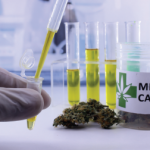Even in states where marijuana isn’t legal to purchase, such as Georgia, patients ask regularly about how marijuana and cannabis oil may be included in their treatment, says Kelly Weselman, MD, FACR, a rheumatologist with the WellStar Health System in Atlanta. “It’s difficult to have to tell patients we just don’t know,” she says.
Evolving Research, Legalization
The research exploring medicinal cannabis in various forms for rheumatology is “evolving very rapidly,” says Daniel Clauw, MD, a professor of anesthesiology, medicine (rheumatology) and psychiatry and director of the Chronic Pain and Fatigue Research Center at the University of Michigan in Ann Arbor.
He notes one of the most exciting studies in this area was recently completed by a pharmaceutical company for which he serves as a scientific advisory board member. During the study, researchers showed that CBD alone seems to be effective for treating osteoarthritis.
“This [finding] is exciting because CBD has very few side effects compared with THC,” he shares. “Also, many research studies with cannabis are suggesting that low doses may be more effective than high doses.” Dr. Clauw has also been involved in research exploring cannabis as a more effective option for pain relief than opioids.3,4
Regardless of trends toward legalization at the state level, marijuana is still considered a Schedule 1 drug by the U.S. federal government, a status that remains a significant barrier to research. However, Dr. Clauw suggests rheumatologists in the U.S. pay close attention to good quality studies on cannabis coming from colleagues outside of the U.S., including those working in Canada, Australia and Europe.
In Canada, Mary-Ann Fitzcharles, MD, an associate professor of medicine in the Division of Rheumatology and the Alan Edwards Pain Management Unit at McGill University in Montreal, has long explored the benefits and risks of medicinal cannabis, including its synthetic forms, for pain management.5
With the rapidly increasing legalization of marijuana, Dr. Fitzcharles believes focused clinical research is more critical than ever. In July 2018, marijuana will become a legal recreational substance throughout Canada and is currently available in the country for medicinal use by prescription. She says medical marijuana is available in varying concentrations of THC and CBD. But some concentrations of THC are as high as 30%, which is unacceptable from a medical standpoint. This very high THC content can only be explained as a means to meet the demands for an underlying recreational use being justified as a medicinal therapy, she says. She notes that THC content in recreational marijuana has progressively increased from around 3% in the 1970s to levels as high as 30% today.



